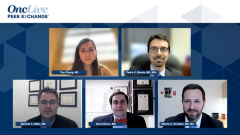
Triplet Regimens in Development for Patients With RCC
Mehmet A. Bilen, MD, explains how triplet regiments might impact treatment selection for first line and beyond.
Episodes in this series

Tian Zhang, MD: For both of you, I’d love to hear your thinking about availability of triplet regimens and how that might impact our care and treatment choices in the frontline setting and also sequencing after triplets. Dr Bilen first, and then we’ll go back to Dr Barata.
Mehmet A. Bilen, MD: This is exciting for RCC [renal cell carcinoma]. The space is evolving, and it’s going to evolve even more after those triplet regimens. The bar is going up, which is very good for our patients. I don’t think we’re too far from curing our patients with advanced clear cell renal cell carcinoma because this is still the most important question we see every day in clinic. Overall, I’m very encouraged for the future. If those trials are going to be positive, they’ll be added to our toolbox, and then we’ll discuss our patients. We all want to see the data, the efficacy but also toxicity, before we justify triplet vs doublet. If we see the results today and all those data are positive, I may offer it to our patients who have very aggressive biology, which we discussed earlier: poor risk, like liver bone metastases; mixed histology. Those patients may benefit from covering all those pathways at 1 time.
The other thing we’re going to look is tolerability and toxicity. At the end of the day, quality of life is very important for our patients, and we don’t want to see any significant adverse effect that’s going to change everything 100%. Last but not least, [we look at] cost. Those agents are getting more effective, but at the same time our patients are going to see the cost. Our health care is going to have to manage this cost because of this reason. Hopefully we’ll see some cost-effectiveness analysis to justify the clinical outcome, toxicity, and cost in general.
Tian Zhang, MD: That’s a wonderful summary for factors that might impact how we choose and decide to use these treatments. Dr Barata, what are your thoughts about how we’ll use triplet regimens?
Pedro C. Barata, MD, MSc: I fully agree with my friend and colleague. Factors like tolerability and safety will be key. I don’t think they’re going to be used 100%; however, they’re definitely going to get momentum in a good number of patients. That’s what I predict is going to happen. Of course, there are factors like overall response rates, including complete responses—we’re all expecting that number to be the double digits. The question is how high that’s going to be. They’re going to drive a lot of us in 1 direction or the other. The other end points might be relevant, like time to second or subsequent therapy, or durable responders. That’s going to be important. Assuming the triplet is going to be delivered safely without a high number of hospitalizations, high dose of steroids, etc. Those are important factors.
Regarding sequencing, it’s a $1 million question. I guess the default will be a TKI [tyrosine kinase inhibitor] afterward. Every time we have the addition of a novel regimen in each setting, what happens afterward is we’ll conduct studies to validate the activity of other therapies after progression. A patient who progresses on triplet therapy has to have nasty biology. That’s not a good thing. With that said, I’m sure there are nasty tumors involving visual disease, or even sarcomatoid rhabdoid features, high tumor mutational burden, de novo metastatic disease, or symptomatic patients. Those factors will definitely force us to consider a triplet therapy as a strong option for those patients.
We’re probably going to think of the most effective agent out there. Of course, if we use cabozantinib-ipilimumab-nivolumab, we’re probably not going to use cabozantinib afterward. We’re going to think about the TKIs. Cabozantinib is a valid refractory-line or second-line option. It’s a very good option, but we have other TKIs out there. In the meantime, we’ll probably have data with HIF inhibitor beyond germline. We’ll see how that behaves in those scenarios. The future is bright. I predict we’re going to develop more data for optimal sequence of agents, but that’s good news coming soon.
Tian Zhang, MD: Wonderful. This has been such a great, insightful conversation about frontline therapies.
This transcript has been edited for clarity.



































